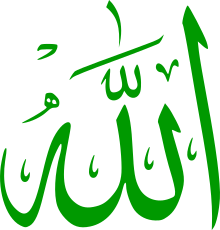Allah (Arabic: ٱللَّٰه, Allāh, IPA: [ʔalˤːɑːh]) is the standard Arabic word for "God" (illah) or precisely "The God" (Al-illah), used by Arabic-speakers of all Abrahamic faiths, including Muslims, Christians and Jews. The term is derived from a contraction of the Arabic article al- and ʾilāh "god, deity" to al-lāh meaning " of (al) none or nothing (lah) deity, God" (ho theos monos); another theory traces the etymology of the word to the Aramaic Alāhā. The term was also used by polytheistic Meccans as a reference to the creator-god, possibly the supreme deity in pre-Islamic Arabia.
subaida
Quotes
- In the name of Allah, Most Gracious, Most Merciful.
Praise be to Allah, the Cherisher and Sustainer of the worlds;
Most Gracious, Most Merciful;
Master of the Day of Judgment.
Thee do we worship, and Thine aid we seek.
Show us the straight way,
The way of those on whom Thou hast bestowed Thy Grace, those whose (portion) is not wrath, and who go not astray.- The Opening of The Quran (Surah al-Fatiha) as translated by Abdullah Yusuf Ali. In Arabic the opening words read: Bismillah ar-Rahman ar-Rahim, and the entire passage is often referred to as "the Bismillah". It opens every chapter of the Qur'an except chapter 9 (see Qur'an 9:1).
- Some of the biggest misconceptions that many non-Muslims have about Islam have to do with the word "Allah". For various reasons, many people have come to believe that Muslims worship a different God than Christians and Jews. This is totally false, since "Allah" is simply the Arabic word for "God" — and there is only One God. Let there be no doubt — Muslims worship the God of Noah, Abraham, Moses, David and Jesus — peace be upon them all.
- Abu Iman 'Abd ar-Rahman Robert Squires, in "Who is Allah?" (31 March 2004)
- I never forgave Allah for saying “Be!” to my father’s leukemia.
- Chris Lawson, Written in Blood (Originally published in Asimov’s Science Fiction June, 1999)
The cardinal principle that Islam ratifies along with that of the right of individual possession is that the individual is in a way a steward of his property on behalf of society; his tenure of property is more of a duty than an actual right of possession. Property in the widest sense is a right that can belong only to society, which in turn receives it as a trust from Allah who is the only true owner of anything. ...
There can be no real place for personal possession unless it carries with it the rights of disposal and use. The condition on which this right must stand is that of wisdom in the disposal; if the disposal of property is foolish, then the ruler or society may withdraw this right of disposal. ...
The right of disposal depends on being mature and being able to fulfill one's duties; when the possessor does not meet these requirements, then the natural fruits of ownership come to an end.
- Sayyid Qutb, Social Justice in Islam (1953), pp. 132-133
